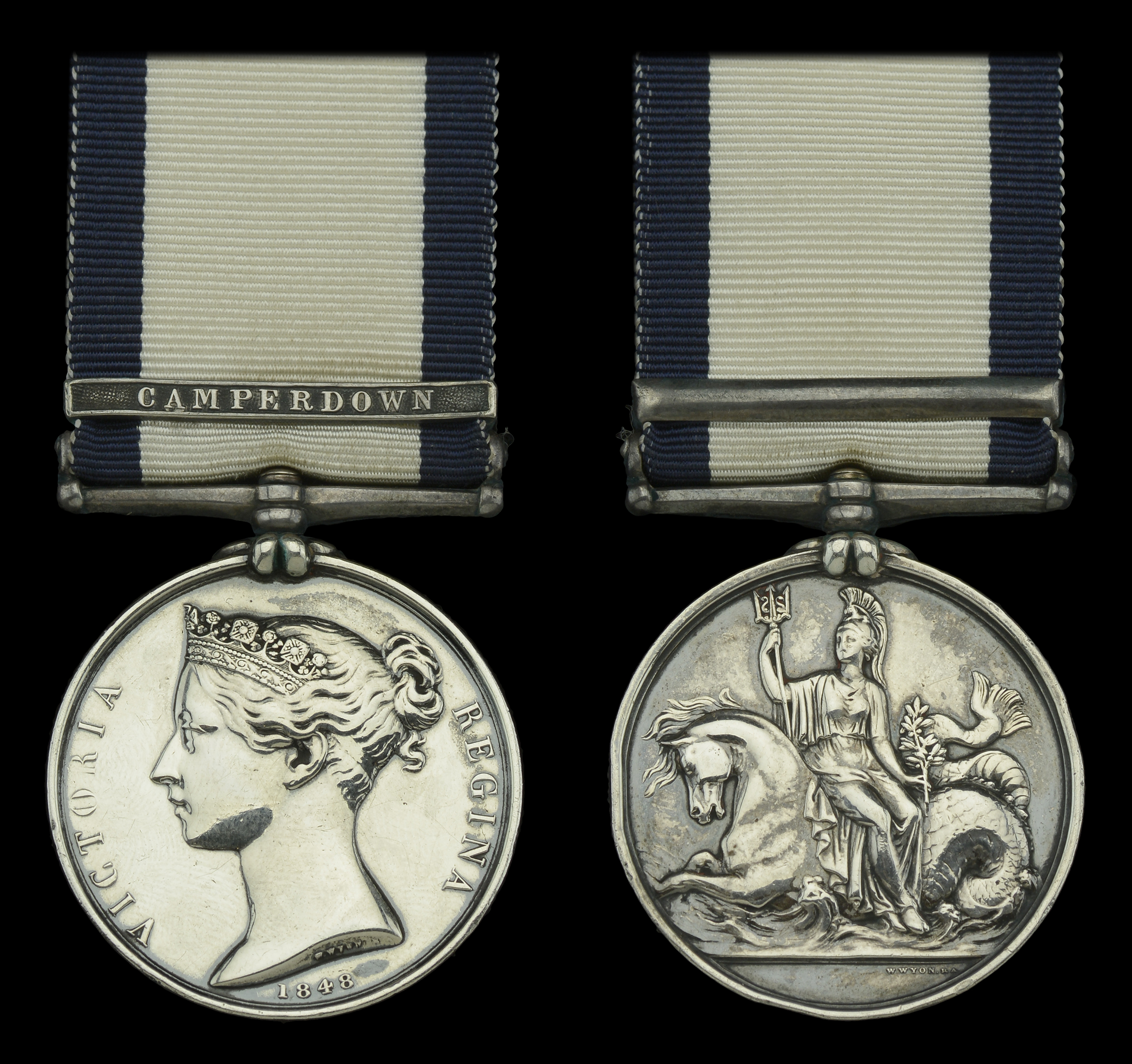The Naval General Service medal awarded to Rear-Admiral Donald Campbell, Royal Navy, who served at the battle of Camperdown as a Lieutenant in H.M.S. Russell and afterwards acquitted himself with gallantry and good conduct on several occasions in various boat actions and in South America in support of General Miranda’s expedition to Venezuela in 1806 Naval General Service 1793-1840, 1 clasp, Camperdown (Donald Campbell, Lieut.) two edge bruises and polished, therefore nearly very fine £4,000-£5,000 --- Importation Duty This lot is subject to importation duty of 5% on the hammer price unless exported outside the UK --- --- Confirmed on the roll as a Lieutenant aboard H.M.S. Russell at Camperdown. Donald Campbell, born in 1788, is eldest son of the late Colin Campbell, Esq., of Auchendoun, co. Argyle; brother of Lieutenant Duncan Frederick Campbell, R.N., who died in 1837, and of two military officers, who both lost their lives in the active service of their country, the one in consequence of the wounds he had received as Senior-Captain of the 59th Regiment, when landing with the grenadiers of that corps at Java in 1811; the other from the effects of the Walcheren fever; and uncle, by marriage, of Commanders Henry Hope, and John Elliot Bingham, R.N. This officer entered the Navy on 4 June 1791, as Able Seaman on board the Assistance 50, Captain Lord Cranstoun, in which ship he served in the Channel until discharged in September following. He re-embarked in 1793, on board the Otter 10, Captain James Hardy; became Midshipman on 20 October in the same year, of the Scorpion 18, Captain Thomas Western, under whom, on proceeding to the West Indies, he captured, among other vessels, La Victoire French privateer, of 18 guns; and was afterwards transferred in succession to the Swiftsure 74, flag-ship of Rear-Admiral William Parker (in which he was present at the unsuccessful attack upon Leogane, St. Domingo, 22 March 1796), and Venerable 74, bearing the flag in the North Sea of Admiral Duncan. In 1797 Mr. Campbell joined, as Acting-Lieutenant, the Russell 74, Captain Henry Trollope, and, after participating in the battle of Camperdown, was confirmed by the Admiralty, 4 January 1798. His next appointment was, 26 October 1798, to the Galatea 32, Captain Hon. George Byng, on the Irish station, where, during a dark and stormy night in the winter of 1800, he was, with a crew of six volunteers, hoisted in a boat from off the booms of the ship to take possession of El Pensée Spanish letter-of-marque, carrying 20 men, whom for 10 days he had the onerous duty of keeping in subjection. On 15 October 1802, he obtained the First-Lieutenancy of the Carysfort 28, Captains George Mundy and Robert Fanshawe, in the boats of which frigate he captured a French letter-of-marque on the coast of Norway in 1803. He afterwards accompanied a large convoy to the West Indies, and subsequently to his appointment, 20 February 1805, to the command of the Tobago schooner, signalised himself in a successful attack made in company with the Curieux sloop on two merchantmen, lying for protection under the batteries at Barcelona, on the coast of Caraccas. Having assumed, 18 September 1805, the acting-command of the Lily 18, Captain Campbell, in the spring of 1806, had the good fortune, after a long chase, to capture the Leander, of 22 guns and 220 men, with General Miranda on board, returning from a vain endeavour to rear the standard of independence in South America. In the second and equally impropitious attempt which Miranda, owing to the assistance of Sir Alexander Cochrane, was induced to make, Captain Campbell, as the Naval Commander-in-Chief of the expedition, acquitted himself of his responsible charge with all the accustomed gallantry and judgement of a British officer. He subsequently, for his general good conduct and attention to the interests of Trinidad, received the public thanks of the Governor, Council, and merchants; but, in consequence of some mismanagement at head-quarters, he does not appear to have been officially promoted until confirmed, 4 May 1807, in the command of the Pert 16, to which sloop he had been appointed on 30 of the preceding January. On 16 October following he was unfortunately wrecked, and lost 12 of his crew, in a hurricane off the island of Margarita, a disaster, however, of which a subsequent court-martial most honourably acquitted him. Captain Campbell’s ensuing appointments were, 13 September 1809, to L’Espiègle 16, in which he convoyed two ships to the West Indies; 29 April 1810, by exchange, to the Port d’Espagne sloop, on the latter station; and, 22 September 1810, to the Rosamond 18, employed successively in defending the trade of Trinidad, conveying a mail and some specie from Jamaica to England, escorting various fleets of merchantmen, and protecting the fisheries on the coast of Labrador and the north shores of Newfoundland. He attained Post-rank on 1 August 1811, but did not leave the Rosamond until 28 May 1814. He afterwards, from 1822 to 1832, officiated as an Inspecting-Commander in the Coast Guard; and on 1 October 1846, was made a Flag officer. Rear-Admiral Campbell died at Barbrech House, Craignish, Argylshire, on 16 December 1856.





